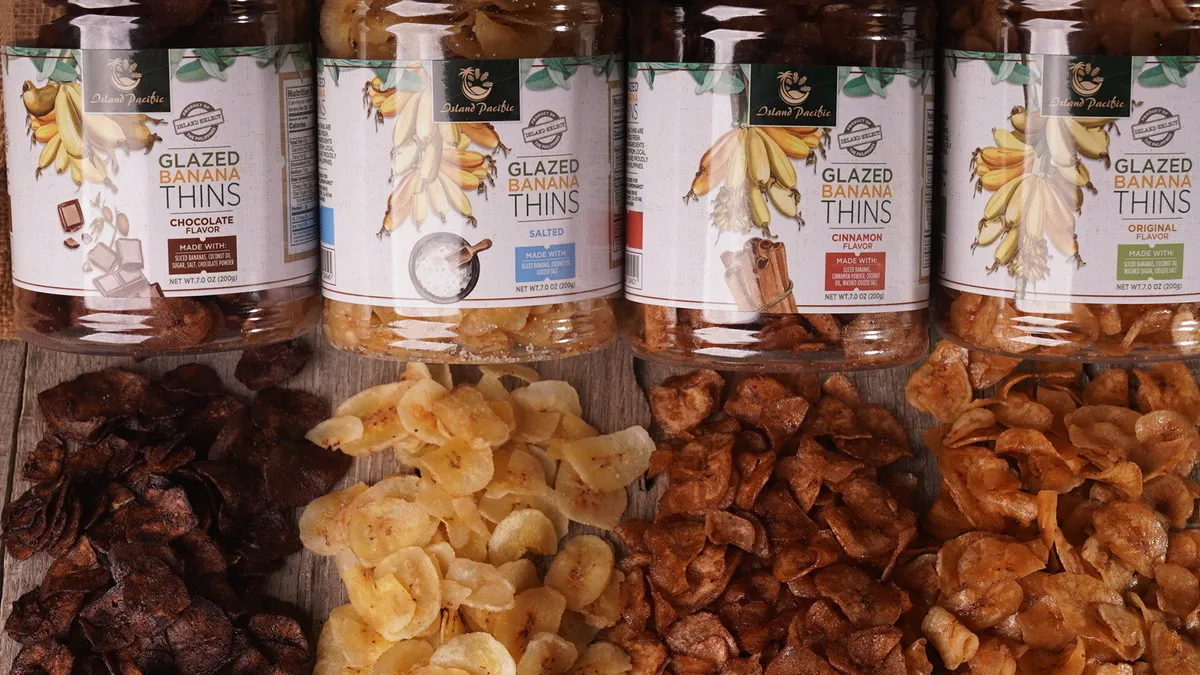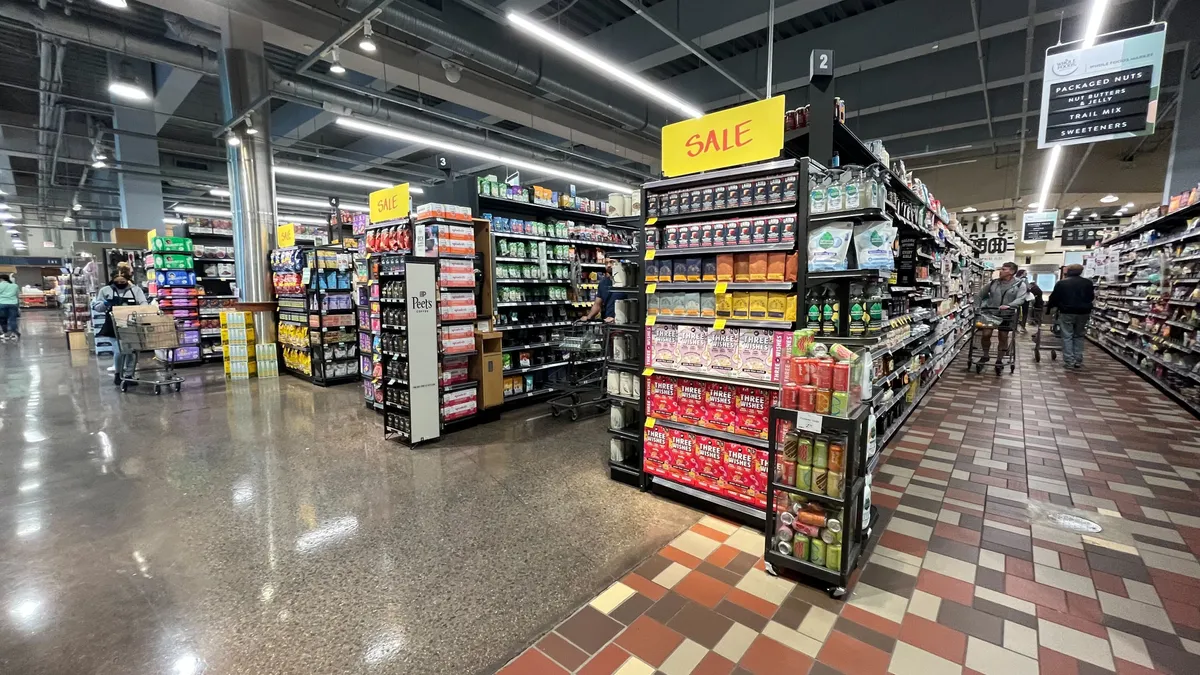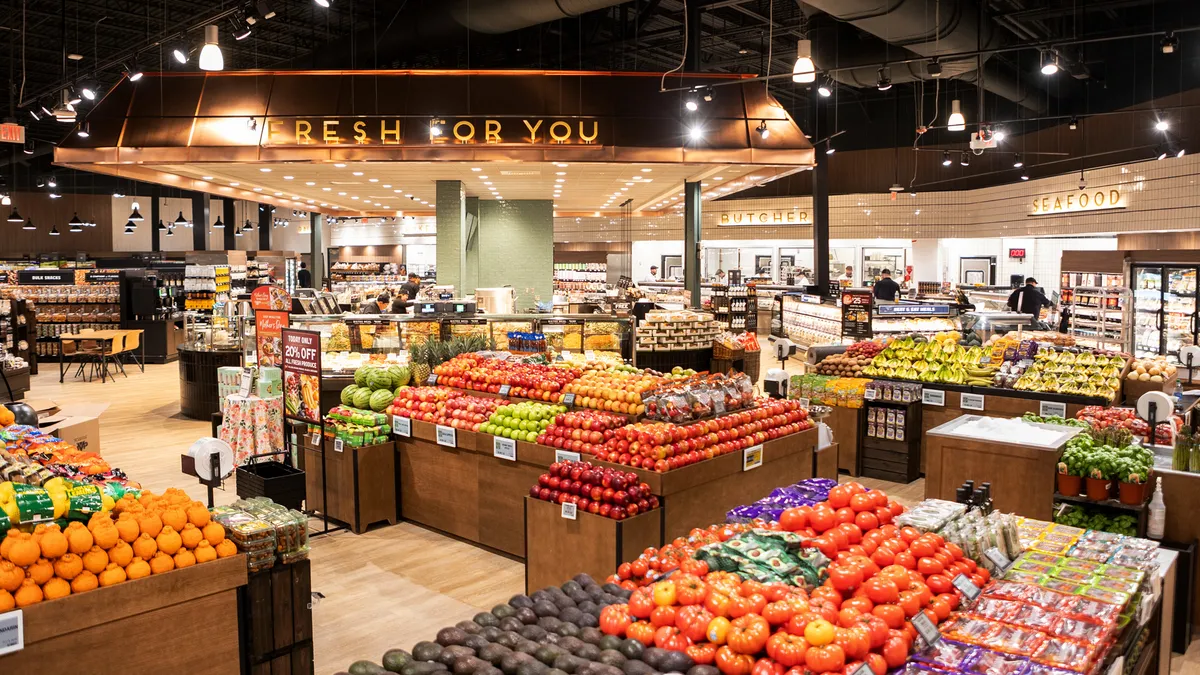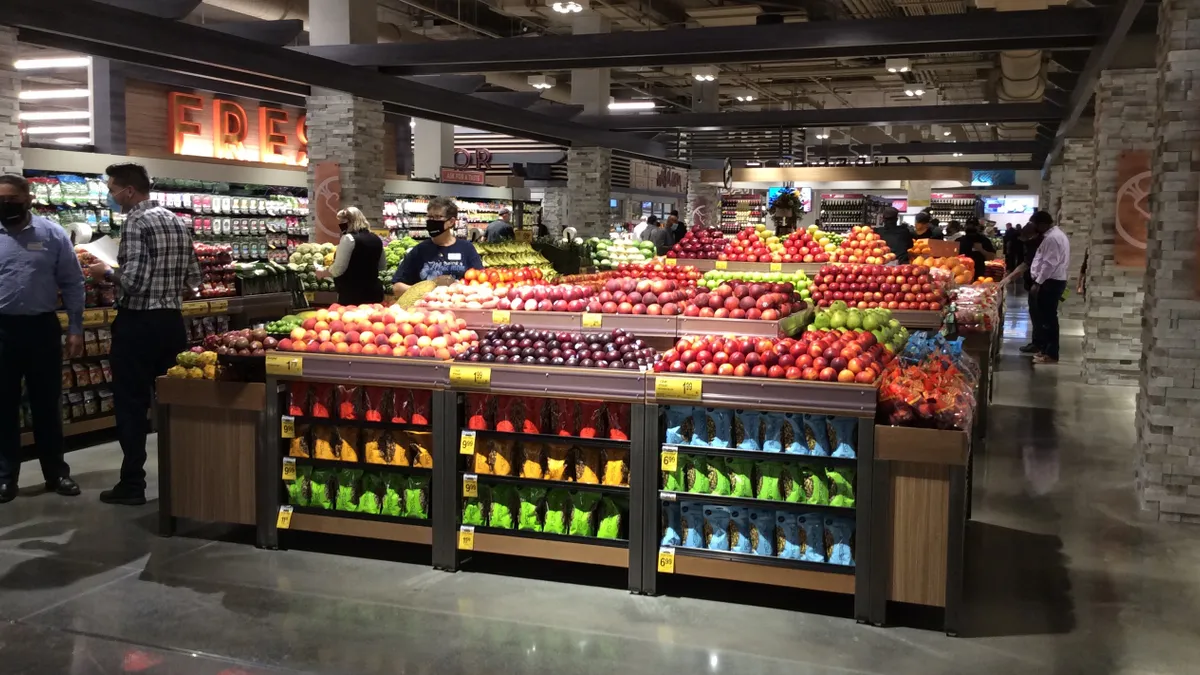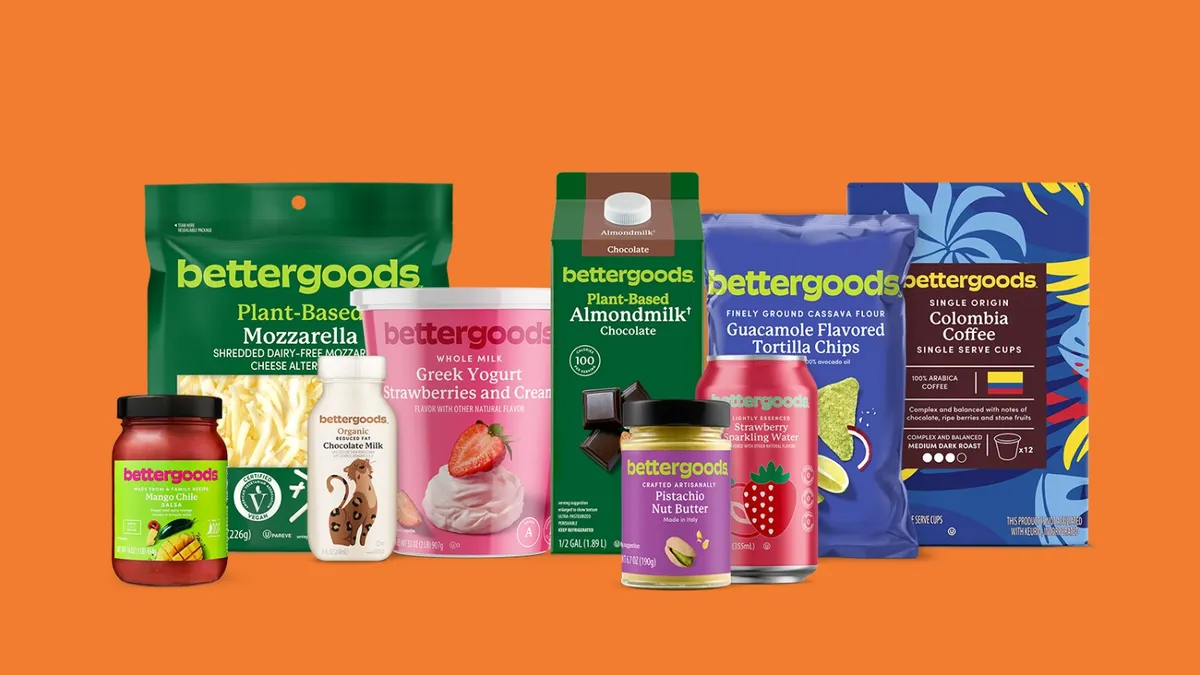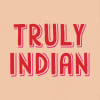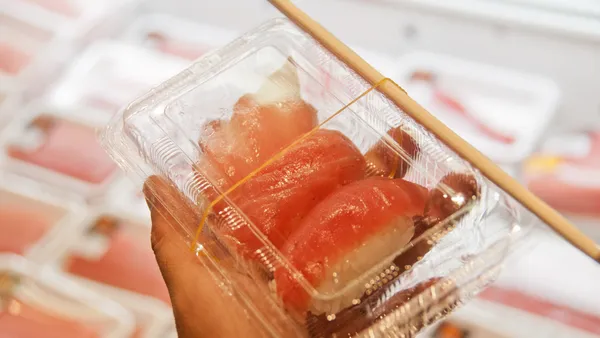Island Pacific's shoppers have come to rely on the grocer for traditional Filipino favorites. Now, the grocer aims to bolster its brand and deepen shopper engagement with a private label line that expands the 17-store grocer's unique assortment.
Island Pacific Select debuted at the end of last summer and now includes more than 50 products. Under the brand, shoppers can find a mix of traditional Filipino ingredients and non-food items like walis tambo and walis ting ting, which are types of brooms.
For the family-owned chain, which has 14 stores in California and three in Nevada, the store brand is a way to deepen connections with its core customers by offering culturally significant items that they won't find in the ethnic aisles of mainstream grocers. The U.S is home to the most Filipinos abroad, with California as the top state.
Island Pacific Select aims to bring "awareness of our diverse culinary traditions so that our cuisine is recognized and acknowledged as part of American life and society,” said Giselle Töngi, marketing and branding consultant at Island Pacific.
Plans to roll out the private label line have been in the works for years, and the pandemic's disruption on the grocery industry did not impact the decision to launch Island Pacific Select last year, said Maricel Aguilar, R&D director of prepared foods at Island Pacific. Still, the pandemic has made the growth of the line feel like “slow-motion,” Aguilar said, noting that it impacted quality consistency and supplier availability.
The line’s launch highlighted its Glazed Banana Thins — banana chips sourced from the Philippines that come in four flavors: original, chocolate, cinnamon and salted. At the end of December, the grocery chain announced it had added several cooking oils along with cebuchon (pork belly), galbi beef (Korean short ribs) and lato (a type of seaweed known as sea grapes).
In February, the grocer debuted its flavored condensed creamers, along with several recipes that call for them, including ice cream and yema balls, a type of candy. So far, the sweetened condensed milk is the best seller for the private label line, with the mango flavor as the highest-grossing one, Aguilar said. Ube (purple yams) is another popular flavor, she noted. Among the line's frozen vegetables, which don’t have any additives or preservatives, shoppers can find dahon ng malunggay (horseradish leaves) and kinayod na ube (grated purple yam).
Nino Jefferson Lim, Island Pacific's founder and president, said the company's private label offerings have quickly become standouts in their categories. "In specific grocery categories where we introduced a private label [item], our private label brand has been able to capture over 50% market share on that specific grocery category," he wrote in an email. "In some categories, like frozen vegetables, our private label is capturing almost 80% of the category's total sales."
Island Pacific Select builds on recent efforts to strengthen the chain's shopper base, from rolling out online shopping in early summer to announcing at the end of 2020 that it now exclusively carries all-natural ice cream made from fresh carabao's milk from Arce Dairy, along with ensaymadas, a type of sweet pastry topped with butter, sugar and cheese, from Muhlach Ensaymada.
For Island Pacific's Corporate Chef Donita Rose Cavett, who is half Filipino and half American and was raised in the Philippines, it’s been hard to cook favorite Filipino dishes in the U.S. because she’s not able to find the same types of ingredients.
Cavett said it’s a treat that Island Pacific’s brand carries several flavors of halo halo — a dessert made of shaved ice with various sweets, including sweet beans and nata de coco (coconut jelly).
“These are things that for the past, well I’d say 30-plus years of cooking, I would have never thought that we would come up with a product that would improve the halo halo because it’s so traditional,” Cavett said.
Promoting private label
Along with celebrating Filipino culture and cuisine, the private label line aims to appeal to both traditional and more modern cooking approaches. Even the packaging for the private label line, which features a tropical motif with a modern twist and descriptions of each product, is looking to bridge generational divides.
"Whenever Filipino do designs to represent the Filipino people, oftentimes it's very folksy or very traditional looking ... I think the design now represents the old and the new together," Cavett said.
Island Pacific has tied its private label to its rewards program, frequently awarding double points when people shop the line, Töngi said.
The supermarket chain has also turned to social media and Filipino culinary influencers to spread the word. For example, Island Pacific has been sending their private label products to Greggy Soriano, a chef, cake designer, YouTuber and content creator, who has highlighted the products in his Instagram posts about creating baked goods, Töngi said.
“We don’t give them any direction in terms of how they want to help us promote it,” Töngi said. “We simply just give them the offering to be able to use the ingredients, and so often, they don't have any other place to find those products.”
As the line grows, the team is exploring marketing opportunities, like adding more recipe suggestions, Cavett said.
Private label brands can boost margins by 10% to 20% — varying by category, said Marco Valentini, partner and managing director at The Boston Consulting Group. However, grocers often see short-term losses with private label as they navigate costs and finding the right balance between offering private label and national brands.
“It's not an easy path, and it's a long-term commitment. [It takes] 18 to 24 months to really embrace this,” Valentini said.
Private brands account for $120 billion in sales each year —roughly 18% of the overall market — in the U.S., according to the Boston Consulting Group. During the first quarter of 2020, as the pandemic hit the U.S., grocery stores saw private label increase 12.7% in dollar volume and 9.7% in unit volume compared to the year before, according to Nielsen data cited by the Private Label Manufacturers Association.
Growing Island Pacific Select
Next up, the grocery chain plans to add spices to its private label offerings. The packaging will include information about the traditional use at the top, while the bottom will have a recipe with a modern twist, Cavett said.
For example, the tamarind soup base, which usually gets mixed with vegetables and meat, includes directions on how to make skinless, boneless salmon. “You just sprinkle the seasoning on it and you can grill it, and it actually tastes like the soup itself,” Cavett said. For the spice mix that gets used for caldereta, a meat stew, Cavett has a suggestion for shepherd’s pie.
Aguilar and Cavett said the new recipe ideas are a way to appeal to younger consumers that are looking to experiment with their cooking.
So far, six seasoning packets have been created for the line. “I've been doing a bit of a fusion of different cuisines around the world, but yet, letting the Filipino elements shine,” Cavett said.
As the brand expands, the team has been examining sales to determine which products are the most popular to craft its private label line, Aguilar said. The line supports manufacturers, producers and artists in the Philippines, where roughly 85% of the private label products are exported from.
“We look at what the Filipino American consumers are purchasing the most of, and we go back to the manufacturers to figure out how we can find a supplier that can meet the demands,” Töngi said.
Valentini said that it's uncommon to find imported categories in grocery stores with a few exceptions like Trader Joe's and Kroger, which has its HemisFares brand focused on imported, global flavors.
Right now, Island Pacific is focused on the one private label brand, but might launch more brands in the future as it aims to reach every product category, Aguilar said.
“It’s going to be boundless,” she said.



